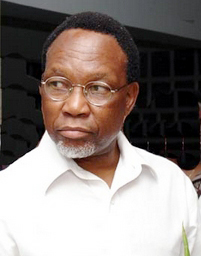
Workers and the poor of South Africa looked to “a new dawn” following the leadership upheaval in the country’s dominant party, the African National Congress.
With only months left in his second and final term, Thabo Mbeki resigned as the country’s president, following a call by his own party to vacate the post.
The decision by the party’s National Executive Committee followed a judge’s ruling throwing out fraud and bribery charges against ANC President Jacob Zuma. Judge Chris Nicholson suggested in his verdict that there had been political interference by Mbeki’s administration in the Zuma case.
Zuma is widely expected to contest next year’s elections but since he does not currently serve as a member of Parliament he was not eligible for the South African presidency right away.
Instead, Mbeki’s replacement is veteran ANC activist and former union leader Kgalema Motlanthe, a widely respected politician associated, like Zuma, with the left majority of the party.
The nation’s third president since the end of apartheid 14 years ago, Motlanthe was sworn into office Sept. 25. In his first address to the nation, he proclaimed, “Over the course of the last few days, we have proven the durability of our constitutional order and the vibrancy of our democracy.”
Motlanthe is considered a transitional leader until Zuma runs for president next year, when there is little doubt he would win. But, since the National Prosecuting Authority has threatened to appeal Judge Nicholson’s ruling, Zuma’s election prospects could be complicated by another court battle. In such a situation, Motlanthe could emerge as the ANC’s alternative candidate.
Indeed, it was the announcement by prosecutors that they would appeal and re-launch their case against Zuma which provoked the party’s action against Mbeki. Zuma’s supporters believed Mbeki had been pursuing a legal vendetta against Zuma since Zuma was fired as deputy president of South Africa in 2005.
Zuma’s backers demoted Mbeki from his position as ANC president and voted Zuma his replacement at last December’s party convention. Since then, Mbeki was viewed as a lame-duck president.
While news reports have focused on the corruption charges against Zuma and his rivalry with Mbeki, more fundamental economic and social problems affecting South Africa’s workers were the key factors determining Mbeki’s fall.
During his presidency, Mbeki championed “fiscal discipline” and other measures demanded by advocates of neoliberalism while the crisis facing workers intensified. Blade Nzimande, general secretary of the South African Communist Party, asserted in an address to his party’s National Policy Conference last weekend, “Monopoly capital in our country has succeeded in asserting a relative hegemony over the broad direction of our post-apartheid state and society. This hegemony was secured, in part, thanks to the leadership collective around comrade Mbeki.”
It is anticipated that the new government will focus more attention to creating jobs, improving health care and building homes. President Motlanthe said his government was committed to realizing South Africa’s goal of halving poverty and unemployment by 2014.
As a result of the political changes, the state of Zimbabwe’s power-sharing talks was in question since Mbeki served as mediator between President Robert Mugabe and the opposition. Mugabe was reported to have termed Mbeki’s resignation “devastating.” Another result celebrated with much enthusiasm by South African AIDS activists was the dismissal of Mbeki’s health minister, Manto Tshabalala-Msimang, infamous for her promotion of a combination of beetroot, garlic and lemon as a treatment for AIDS.
South Africans have greeted the peaceful, democratic change in national leadership.
The nation’s first democratic leader, Nelson Mandela, in a letter to the new president, said the country was in “good hands.” Mandela described Motlanthe as “a quiet, firm and principled leader, one who puts reason above emotions and one who seeks to unite rather than divide.”
South Africa’s Communist Party, which is part of the ruling Tripartite Alliance with the ANC and the Congress of South African Trade Unions, also welcomed the new president as “a truly humble son of workers of our country, [who] truly understands the needs and aspirations of the ordinary people of our country.” Party leader Nzimande said at a recent SACP conference that the leadership change “should mark a new dawn for our country,” providing an opportunity “to drive an agenda to fight poverty, create jobs and build a better life for our people.”











Comments